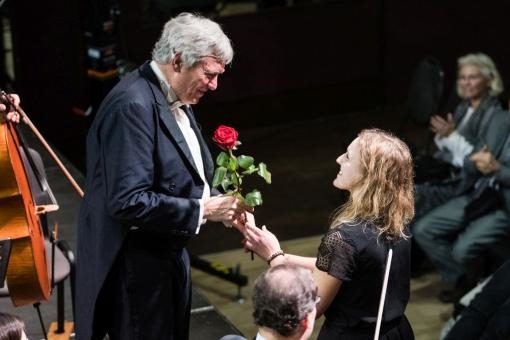Norwegian, Danish, and Finnish composer. Add to this the literary subject matter of Denmark's Henrik Ibsen and Shakespeare's Hamlet set in Denmark. All under the baton of a Danish conductor. The programme, entitled “Ancient Nordic Tales”, will be performed by the Brno Philharmonic next Thursday and Friday at the Janáček Theatre. It will feature Hans Abrahamsen's Let me tell you, which is one of the most important musical works of the last decade and has been performed on prestigious stages around the world.
Hans Abrahamsen attracted the attention of the international music community immediately after the premiere of Let me tell you. It tells the story of Ophelia from Shakespeare's Hamlet, but from the point of view of the heroine herself. “He captures her feelings and creates poetic images from them, which in Abrahamsen's setting gain an impressive charge with a built-up conclusion,” said Vítězslav Mikeš, dramaturg of the Brno Philharmonic. He added that the piece has won seven prestigious awards and the circle of soloists taking on the solo part is expanding.
Ophelia will be performed in Brno by American soprano Nicole Chevalier. After a mutual performance last year in Hannover, she was requested by conductor Michael Schønwandt, who will lead the concerts in Brno. The work was commissioned by the Berlin Philharmonic in 2013. Since then it has been performed in London, Paris, Toronto, Boston, and dozens of other venues including Carnegie Hall. Shortly after the premiere, “at the beginning of the setting of Griffiths' novel Let Me Tell You was the writer's wife's idea for an original birthday present: a love song. Witnessing the transformation of what a woman might have felt in the past and can feel today, the writer wove a story using just 483 words – Ophelia's vocabulary in Shakespeare's play,” said music publicist Wanda Dobrovská.
The composition is divided into three parts: past, present, and future. Ophelia first looks to the past, singing about a time when time did not exist. The second part is a love song, where she compares her love to the sun which revives and burns, and in the third “act” she departs into a snowy nothingness. “The music reaches its climactic exuberance when Hamlet becomes the sun for Ophelia and the heroine is transformed into the object of his reflection. Already present in the background of the picture is the sharp note of pain and unhappiness. On her last journey through the winter landscape, Ophelia gives up love, everything,” Dobrovská says.
I am your mirror -
mirror maddened by your light,
by a mirror that rained light rain
and the rain, the rain didn't stop, and it keeps on raining,
a mirror in which light shines,
light without end
The final movement is performed by soprano Barbara Hannigan, who premiered the work.
The Nordic programme, which also includes selections from Greig's Peer Gynt suites and Jean Sibelius' Symphony No.5, will be conducted by the aforementioned Michael Schønwandt, former music director of the Royal Orchestra and the Royal Opera House in Copenhagen. “He is returning to Brno after three years of conducting Sibelius' Symphony No.2. We invite him repeatedly and we would like to continue this, because we could hardly find someone more called to Sibelius,” said Brno Philharmonic director Marie Kučerová. The Finnish national composer's work is inspired by the Nordic landscape, its harsh climate, mountains, and lakes as well as contemporary romantic ideals and folklore.













No comment added yet..